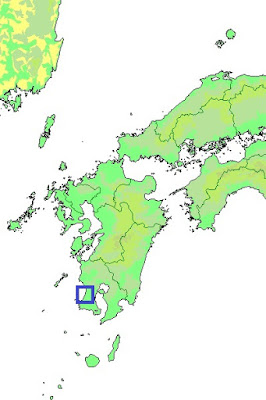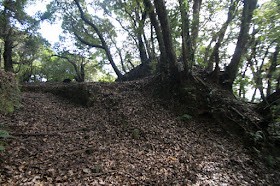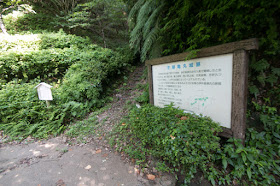Izaku Castle
-Restart from disorder by grandfather-
Overview
Name: Izaku castle (Izaku-jo)
Alias: Kamemaru-jo (Kamemaru castle)
Place: Fukiage Hioki city, Kagoshima
Location: 31.51397040563125, 130.36253945360204
Type: Mountain Castle
Built: 14th century
Remaining remnants: Clay walls and dry moats
Title:
Izaku castle is located at Shiroyama hill, one of 70 meter height from hillside in the western shore of middle part of Satsuma peninsula, another side of current Kagoshima city. Izaku area is at the north edge of long and narrow flat area spreads from south part of Hioki city to Minamisatsuma city.
This area is just 15 kilometer apart from Kagoshima city, the center of Satsuma province (western part of Kagoshima prefecture) or Ijyuin area, an important area connecting Kagoshima area and north part of province such as Izumi area, but also separated by hills from both area. Because of such geographical situation, Izaku area was suitable to see the situation of Kagoshima city from little distant area and seek for the chance.
Precise year is unknown but Izaku castle was built by Izaku Shimazu clan in 14th century. Izaku Shimazu clan was a branch family of Shimazu clan. In 13th century, Tadahisa Shimazu (?-1227), a close retainer of Yoritomo Minamoto (1147-1199) who was the founder of Kamakura Shogunate, was appointed as a magistrate of Shimazusho Manor, the largest manor in Japan spread Satsuma province, Osumi province and Hyuga province. Later Shimazu clan once lost Osumi and Hyuga province as a result of political conflict, but under Muromachi Shogunate they recovered the authority to two nations then became the governor of these three provinces.
But since the middle of 14th century, Shimazu clan suffered from severe internal conflict. As territory of Shimazu clan is a hilly area separated into distant small plain or basin, then Shimazu clan placed their branch families into each area and let them govern their territory. As a result of this, Shimazu clan at that time was a loose union of branch families, and they firmly united against external enemy especially for the battle against Kikuchi clan of Higo province (Kumamoto prefecture), in the period of conflict between two separated Imperial Household in the former half of 14th century.
But after the disappearance of danger they started to oppose each other. Main family of Shimazu clan divided Satsuma province and Osumi province (east half of Kagoshima prefecture) into two houses, but at first these two houses fiercely struggle for the leader position. These two family was once united, but later another strong branch family Sasshu house was established, and under short lived leaders many internal conflict occurred involving Sasshu house or other strong relatives such as Ijyuin clan or Izaku Shimazu clan.
During the continuous struggle between Shimazu family, local lords of Osumi province and Hyuga province (Miyazaki prefecture) left Shimazu clan and established their dominaton. In Osumi province, Kanetsugu Kimotuski (1511-1566) who was the local lord of Kouyama castle captured most part of the province and once overwhelmed Shimazu army.
Beside, in Hyuga province, Ito clan which was the local lord at Tonokori castle gradually grew since the end of 15th century, and Yoshisuke Ito (1512-1585) finally captured Obi castle and prosperous Aburatsu port from Shimazu clan after 80 years battle. Authority of Shimazu clan as a governor of three provinces was totally lost, and Shimazu clan was attacked by these surrounding warlords and fell into the fateful crisis.
Tadayoshi Shimazu (1492-1568, known as his Buddhist name Jisshinsai) succeeded leader position of Izaku Shimazu clan in 1506. Grown up under wise mother and monk, Tadayoshi was familiar to Buddhism and made good administration to his territory, then gradually his fame increased. At this time Izaku castle was expanded as a main base of Izaku Shimazu family.
Izaku castle is located at the edge of hilly area between Izaku area and Kagoshima city, and spreads over a 1000 meter long and 300 meter wide hill separated by river and valley from backside connecting hill. Izaku castle consist of over 20 flat areas over Shirasu (ancient volcano ash) layer height separated by deep valley. Core areas of the castle such as Higashinojyo, Kuranojyo, Tsurumarujyo, Okarijajyo or Nishinojyo spreads along the main ridge continues from northeast to southwest, and Yamanojyo fort was built at another peak at the south of main ridge.
Center part areas such as inner part of Higashinojyo, Kuranojyo or Tsurumarujyo might be built at the first stage, and they were small areas keeps natural shape of terrain. Contrary to this, outer part area such as outer part of Higashiojyo, Okariyajyo, Nishinojyo or Yamanojyo were built later by strong authority, thus these areas are large and have artificial defense facility such as line of clay walls or deep dry moats. Main gate of the castle existed at its south side, and backside gate was built at its north part.
In 1526, Katsuhisa Shimazu (1503-1573),. the leader of Shimazu main family but suppressed by Sanehisa Shimazu (1512-1553), the leader of Sasshu clan, asked assistance to Tadayoshi. Based on this request Tadayoshi sent his eldest son Takahisa Shimazu (1514-1571) as an adopted son of Katsuhisa and grasped main family. But Sanehisa strongly resisted to this decision and let Katsuhisa break this promise then attacked Takahisa stayed at Kagoshima city. Takahisa once retreated to Izaku area, and Sanehisa once captured leader position of Shimazu main family.
But Sanehisa could not manage the clan well and Tadahisa started counter attack to Sanehisa. Tadahisa at first captured south part of Satsuma peninsula to secure its backside, and also tried to shut the communication between Kagoshima area and Izumi area, the main base of Sanehisa. Finally Tadahisa and Sanehisa fought a decisive battle in 1536, and finally Tadahisa expelled Sanehisa from Sanehisa from Kagoshima city and Takahisa became the leader of Shimazu main family again.
At that year, Tadayoshi and Takahisa moved from Izaku castle to Ichiuji castle, which located at Ijyuin area at the middle of Kagoshima area and Izumi area, to accelerate the unification of Satsuma province. Severe conflict against other relative family continued over 15 years, but by around 1550 Tadayoshi and Takahisa let other families to follow and virtually united Satsuma province.
Tadahisa who saw the unite of Satsuma province retired at this time, but still supported Takahisa who was busy for outside battle and made effort to develop industry and commerce in the province. Finally when Tadayoshi died at 1568, Shimazu clan gradually overwhelmed Kimotsuki clan and Ito clan, and recovery of Osumi province and Hyuga province as an earnest wish of Shimazu clan as a governor of three provinces was close at hand.
Later Izaku castle was abolished but was kept as a base of local administration. Excellent four sons of Takahisa, it mean Yoshihisa Shimazu (1533-1611), Yoshihiro Shimazu (1535-1619), Toshihisa Shimazu (1533-1592) and Iehisa Shimazu (1547-1587) were said as born at this castle, and memorial of four brothers is built at the Tsurumarujyo area. Now castle site became a historical site, and largeness of Izaku castle shows underlying power of Izaku Shimazu clan which restored desperately disorder situation of Shimazu clan.
20 minutes walk from Izaku bus stop of Kagoshima-Kotsu bus from JR Kyushu Kagoshima-Honsen line Ijyuin station. 20 minutes drive from MInami-Kyushu Nishimawari Jidoshado Ijyuin interchange.
Ichiuji Castle -Unification battle of Kyushu island by father and four brilliant brothers-
Kagoshima Castle -Confrontation with central authority-
Type: Mountain Castle
Built: 14th century
Remaining remnants: Clay walls and dry moats
Title:
Brief History
Izaku castle is located at Shiroyama hill, one of 70 meter height from hillside in the western shore of middle part of Satsuma peninsula, another side of current Kagoshima city. Izaku area is at the north edge of long and narrow flat area spreads from south part of Hioki city to Minamisatsuma city.
This area is just 15 kilometer apart from Kagoshima city, the center of Satsuma province (western part of Kagoshima prefecture) or Ijyuin area, an important area connecting Kagoshima area and north part of province such as Izumi area, but also separated by hills from both area. Because of such geographical situation, Izaku area was suitable to see the situation of Kagoshima city from little distant area and seek for the chance.
Origin of Shimazu clan and Izaku castle
Precise year is unknown but Izaku castle was built by Izaku Shimazu clan in 14th century. Izaku Shimazu clan was a branch family of Shimazu clan. In 13th century, Tadahisa Shimazu (?-1227), a close retainer of Yoritomo Minamoto (1147-1199) who was the founder of Kamakura Shogunate, was appointed as a magistrate of Shimazusho Manor, the largest manor in Japan spread Satsuma province, Osumi province and Hyuga province. Later Shimazu clan once lost Osumi and Hyuga province as a result of political conflict, but under Muromachi Shogunate they recovered the authority to two nations then became the governor of these three provinces.
But since the middle of 14th century, Shimazu clan suffered from severe internal conflict. As territory of Shimazu clan is a hilly area separated into distant small plain or basin, then Shimazu clan placed their branch families into each area and let them govern their territory. As a result of this, Shimazu clan at that time was a loose union of branch families, and they firmly united against external enemy especially for the battle against Kikuchi clan of Higo province (Kumamoto prefecture), in the period of conflict between two separated Imperial Household in the former half of 14th century.
But after the disappearance of danger they started to oppose each other. Main family of Shimazu clan divided Satsuma province and Osumi province (east half of Kagoshima prefecture) into two houses, but at first these two houses fiercely struggle for the leader position. These two family was once united, but later another strong branch family Sasshu house was established, and under short lived leaders many internal conflict occurred involving Sasshu house or other strong relatives such as Ijyuin clan or Izaku Shimazu clan.
Disorder of Shimazu clan
During the continuous struggle between Shimazu family, local lords of Osumi province and Hyuga province (Miyazaki prefecture) left Shimazu clan and established their dominaton. In Osumi province, Kanetsugu Kimotuski (1511-1566) who was the local lord of Kouyama castle captured most part of the province and once overwhelmed Shimazu army.
Beside, in Hyuga province, Ito clan which was the local lord at Tonokori castle gradually grew since the end of 15th century, and Yoshisuke Ito (1512-1585) finally captured Obi castle and prosperous Aburatsu port from Shimazu clan after 80 years battle. Authority of Shimazu clan as a governor of three provinces was totally lost, and Shimazu clan was attacked by these surrounding warlords and fell into the fateful crisis.
Tadayoshi Shimazu (1492-1568, known as his Buddhist name Jisshinsai) succeeded leader position of Izaku Shimazu clan in 1506. Grown up under wise mother and monk, Tadayoshi was familiar to Buddhism and made good administration to his territory, then gradually his fame increased. At this time Izaku castle was expanded as a main base of Izaku Shimazu family.
Structure of Izaku castle
Izaku castle is located at the edge of hilly area between Izaku area and Kagoshima city, and spreads over a 1000 meter long and 300 meter wide hill separated by river and valley from backside connecting hill. Izaku castle consist of over 20 flat areas over Shirasu (ancient volcano ash) layer height separated by deep valley. Core areas of the castle such as Higashinojyo, Kuranojyo, Tsurumarujyo, Okarijajyo or Nishinojyo spreads along the main ridge continues from northeast to southwest, and Yamanojyo fort was built at another peak at the south of main ridge.
Center part areas such as inner part of Higashinojyo, Kuranojyo or Tsurumarujyo might be built at the first stage, and they were small areas keeps natural shape of terrain. Contrary to this, outer part area such as outer part of Higashiojyo, Okariyajyo, Nishinojyo or Yamanojyo were built later by strong authority, thus these areas are large and have artificial defense facility such as line of clay walls or deep dry moats. Main gate of the castle existed at its south side, and backside gate was built at its north part.
Reunion of Satsuma province
In 1526, Katsuhisa Shimazu (1503-1573),. the leader of Shimazu main family but suppressed by Sanehisa Shimazu (1512-1553), the leader of Sasshu clan, asked assistance to Tadayoshi. Based on this request Tadayoshi sent his eldest son Takahisa Shimazu (1514-1571) as an adopted son of Katsuhisa and grasped main family. But Sanehisa strongly resisted to this decision and let Katsuhisa break this promise then attacked Takahisa stayed at Kagoshima city. Takahisa once retreated to Izaku area, and Sanehisa once captured leader position of Shimazu main family.
But Sanehisa could not manage the clan well and Tadahisa started counter attack to Sanehisa. Tadahisa at first captured south part of Satsuma peninsula to secure its backside, and also tried to shut the communication between Kagoshima area and Izumi area, the main base of Sanehisa. Finally Tadahisa and Sanehisa fought a decisive battle in 1536, and finally Tadahisa expelled Sanehisa from Sanehisa from Kagoshima city and Takahisa became the leader of Shimazu main family again.
At that year, Tadayoshi and Takahisa moved from Izaku castle to Ichiuji castle, which located at Ijyuin area at the middle of Kagoshima area and Izumi area, to accelerate the unification of Satsuma province. Severe conflict against other relative family continued over 15 years, but by around 1550 Tadayoshi and Takahisa let other families to follow and virtually united Satsuma province.
Afterward of castle
Tadahisa who saw the unite of Satsuma province retired at this time, but still supported Takahisa who was busy for outside battle and made effort to develop industry and commerce in the province. Finally when Tadayoshi died at 1568, Shimazu clan gradually overwhelmed Kimotsuki clan and Ito clan, and recovery of Osumi province and Hyuga province as an earnest wish of Shimazu clan as a governor of three provinces was close at hand.
Later Izaku castle was abolished but was kept as a base of local administration. Excellent four sons of Takahisa, it mean Yoshihisa Shimazu (1533-1611), Yoshihiro Shimazu (1535-1619), Toshihisa Shimazu (1533-1592) and Iehisa Shimazu (1547-1587) were said as born at this castle, and memorial of four brothers is built at the Tsurumarujyo area. Now castle site became a historical site, and largeness of Izaku castle shows underlying power of Izaku Shimazu clan which restored desperately disorder situation of Shimazu clan.
Access
20 minutes walk from Izaku bus stop of Kagoshima-Kotsu bus from JR Kyushu Kagoshima-Honsen line Ijyuin station. 20 minutes drive from MInami-Kyushu Nishimawari Jidoshado Ijyuin interchange.
Related Castles
Ichiuji Castle -Unification battle of Kyushu island by father and four brilliant brothers-
Kagoshima Castle -Confrontation with central authority-
















































No comments:
Post a Comment